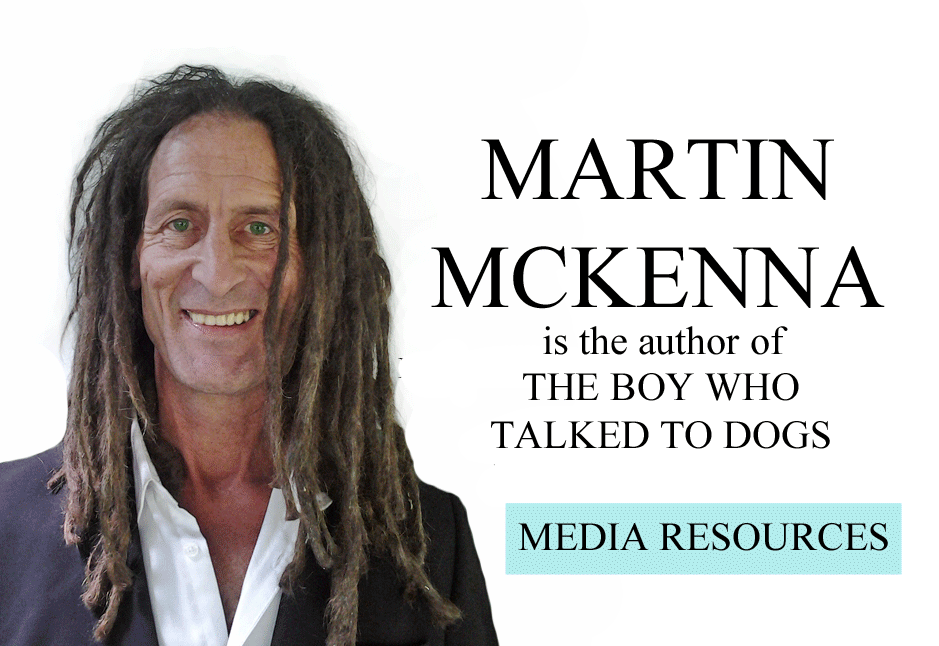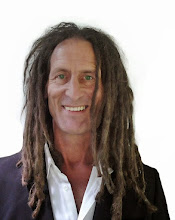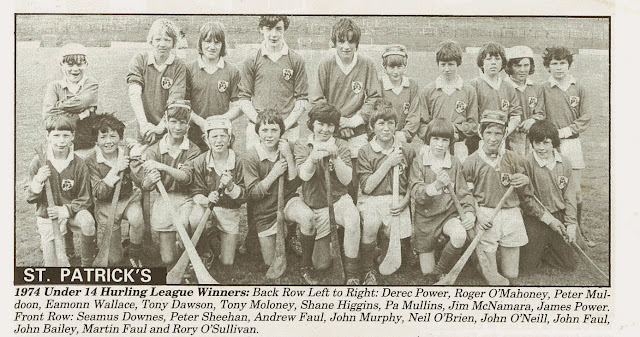This book is a loving apology to my mother,
Sigrid.
I was always trouble as a boy, growing up
in Garryowen in Limerick, Ireland. That’s when I was known as Martin Faul and
hadn’t changed my name yet. I was a real bold rebel of a kid but I had my
reasons. I had ADHD, or severe hyperactivity, and was I also dyslexic. It was
so bad that by sixth class I could barely read and write my own name. I always
felt different from everyone else and got terribly bullied for being a ‘ stupid
freak.’ In the end I got sick of the cruelty of humans. One night I climbed out
my window and ran away. I ended up living rough on the streets with a pack of
six stray dogs for three years. I wrote this book as a heartfelt apology to my
beloved mammy, Sigrid Faul, who never stopped trying to get me to come home and
worried herself sick over me. Sadly, she passed away from cancer when I was in
my early twenties.
I’ve always carried some guilt around that
I put my mother through far too much emotional stress and this book has been my
way of working through these feelings. She was an amazing woman and extremely
beautiful. A German university student, she fell in love with and my Irish
father while studying at the London School of Economics. They married and moved
to Garryowen in Limerick, Ireland and settled down and had eight children. Three
of us – Andrew, John and I – were identical triplets. Here she is with my dad
when she came home from hospital with us triplets.
It could be very tricky being an identical
triplet. You don’t have much privacy or individuality and we were constantly
scrapping over everything. There was a definite pecking order. John was the
boss, Andrew was next in importance and I was the runt and always came last. It
soon became apparent that I was different. Like I said earlier, I had ADHD
which stands for Attention-Deficit-Hyperactivity-Disorder, otherwise known as
severe hyperactivity and was extremely dyslexic.

Everyone’s seen ADHD kids in action.
They’re the kids you knew back at school who wouldn’t sit still in class. They
annoyed people till they had no friends left. They constantly caused the
teacher to shout and tear at their hair. Drove their parents crazy doing
stupidly reckless things. Even today, society doesn’t understand how powerful
the ADHD condition is. People believe the child simply needs to learn more will
power, but it’s actually a chemical reaction going on inside their brain and
body and real strategies are needed to cope with this difficult disorder. Many
mothers usually end up being the ones who have to deal with an ADHD child
because the father often has it too. Unfortunately, most mothers feel
constantly feel helpless because they don’t know how to help them. It’s also
extremely exhausting to deal with – and causes huge strains on families and
relationships because it’s impossible to keep up with the energy of someone
with ADHD.
My story that I became a success and
settled down happily to find my niche in life has helped a lot of mothers who
have a child with ADHD. They constantly contact me by email to say thank you
for helping people understand the condition better and let me know they’ve
found my career achievements very inspiring. ADHD children are exhausting to
live with and care for – so inspirational stories give these mothers fresh, new
energy to tackle yet another day of draining drama.
My own mother, Sigrid, was an angel and
constantly worried herself sick over me. She tried to reason with me all
through my childhood, trying to get me to stop being so hyperactive and doing
reckless things. However, my untreated condition was too severe for reasoning.
Things weren’t helped by the fact that my father used to drink heavily and
became violent – or that I was so dyslexic, that I couldn’t even read and write
my own name. Unfortunately I had two real bullies of teachers and they made my
life complete hell at school, openly mocking me and beating me when I couldn’t
learn anything. Worse, because we were identical triplets and my mother was
German – locals in the neighborhood started taunting us that we were freaks and
‘Hitler’s secret experiments’. As I grew older, I really began to feel like an
outsider – especially because my brothers had no problems behaving or
learning. It was only me. This made
everyone even angrier at me and made me feel more stupid and useless. It wasn’t
long before the only creatures who really liked and understood me beside my
mother were dogs. Luckily our family had two giant German Shepherds, Major and
Rex, and they became my best friends and protectors.
Here I am in 1974, when I was 12, the year
before I ran away from home. It’s my hurling team – which is an ancient Irish
sport. I’m second from the right, bottom row. John is fourth from the right
bottom row and Andrew is 3rd from the left, bottom row.
One day, my life seemed just too difficult
to cope with any more. My father’s drinking was getting more violent and
erratic. Worst of all, my teachers were going to make me repeat primary school
and start me back in kindergarten again because I was incapable of reading and
writing. However, there was no way I was going to stay behind while my brothers
went on to high school without me. Things weren’t any better out of school: I
was starting to stand up to the local neighborhood bully kids and it seemed
like I was making more human enemies whichever way I turned.
All I wanted to do was get on with my life
in peace but no one would leave me alone. The bullying became unbearable. One
night I’d had enough. When I climbed out my bedroom window, I knew exactly
where to go. I ran away to the outskirts of Garryowen where I knew the stray
dogs of the area hung out at night. Not as many people desexed their dogs back
then so there were always a surprising amount of strays.
As soon as I’d run away and joined up with
the street dogs roaming the area – I knew I’d made the right decision. All the
stress of the human world instantly seemed to roll right off me and I felt like
I could finally relax and be myself. I’d always felt at peace around dogs. They
liked my hyperactive energy. They thought I was fascinating to watch because I
always did such unexpected things and I was always kind to them. I knew I’d
never feel alone around dogs. That was in 1975.
I ended up living rough around the Garryowen
railway line and countryside for three years. During the first few months, I
hooked up with six stray dogs and they became my best friends and family.
Together we became a real pack, though I preferred to call us a gang. We crept
into farmers hay barns at night, burying ourselves down deep in the hay to stay
warm and dry. We scrounged around the local farmhouses and out of the housing
estate bins for food. I also stole milk and bread off people’s doorsteps before
they woke up in the morning. Every night I climbed the locked fence of the
local knackers, Mullins Yard, to steal meat and bones for my dogs – and they
adored me for it.
These three years living rough with my pack
of dogs changed me forever. They were hard years in many ways – it really isn’t
romantic being wet, cold and hungry. However, they were also years of such
incredible freedom and adventure. I had no one to tell me what to do, no one
getting angry or frustrated at me. No drunk, yelling dad or bullying, screaming
teachers. There were no chores or dreaded school to deal with – and not even my
well-meaning brothers bossing me about. Instead, I roamed with the dogs all
over the countryside around Limerick exploring. The dogs were amazing and in
many ways became my mentors – teaching me about manners and responsibility.
Courage and loyalty. Friendship and family. They also taught me how to
communicate in their own language which gave me a skill I had that other people
didn’t know. This gave me great confidence and helped me understand that I wasn’t
stupid – I just happened to learn things differently to other people.
However, at the back of mind was always
that sad, gut-churning guilt over my mother who was distraught and never
stopped trying to get me to return home. This part of my life always fills me
with shame. She had a full time job as a manager of a hotel restaurant, eight
children and a husband who drank – and yet she still worried herself sick over
me. She simply wanted me to find my own safe place in the world – I realise
that now. She was clearly terrified I’d end up becoming a drug addict, a
homeless person for the rest of my life or committing suicide like too many
other boys did back then.
However, all the lessons and morals she’d
taught me as a young boy had sunk in so I stayed safe while I was living rough.
My best friend, Brandan, who was concerned about my mother’s health, finally
persuaded me to return home. This was a difficult decision for me – but
ultimately, I did return. I knew that no matter how much I loved my freedom
with my dogs – I owed her peace of mind. So I returned home and she was lovely
about it – never berating me for my runaway years and always encouraging me to
be my best. Unfortunately, her life was hard. She’d lived through the war, had
eight children, put up with my dad who she loved fiercely and then had to deal
with me. She got sick, contracting cancer and died when I was in my early
twenties.
I wrote my memoir partly as a way of saying
thank you to her for all the kind, patient help she gave me over the years and
also as a way of dealing with my feelings of guilt.
I also hope my story might help people
understand ADHD a little better. Being forced to sit still in a classroom for
hours on end, staring at a blackboard and simply listening to a teacher drone
on is virtually impossible for kids with ADHD. I’d love the education systems
around the world to come up with a better alternative. They’ll look back at how
they treated children with ADHD and see this as the dark ages in education –
truly barbaric – and I shudder to think how many children fell through the
cracks of such an outdated system. All those thousands upon thousands of
untreated children who never stopped believing they were stupid – and this
untrue belief affected them for the rest of their life.
But hey! Don’t worry about my book being
dark and sad – far from it! I’m such an optimistic and energetic person – and
my story bounces along like I do through life, looking for the humor in
everything. That’s why my stray dogs followed me everywhere – I was great fun
to hang around with – and always up for a reckless adventure and a laugh!
I know my mother, Sigrid, would be
extremely proud of the man I am today. The
Boy Who Talked To Dogs is a
great life-story and really captures the noisy, fun side of living in a big
family – especially when you throw identical triplets into the mix. My book was
first published in New York and is now published in Australia, North America,
Canada and Brazil. I was signed by the prestigious Writers House literary
agency in New York – which isn’t bad for a kid who was constantly called Stupid
Boy by his teachers – and who could barely write his own name when he was in
sixth class.
I think of my beloved Mammy every single
day and named my first-born daughter Sigrid after her. Funnily enough, my
daughter really resembles my mother in every way – her classic Nordic looks and
strong, kind, organized and efficient personality. She’s now studying law at
university and writing Young Adult fiction in her spare time. She’s a wonderful
girl! I have four kids altogether, none have ADHD and we’re very close. You can
see my son Fintan on the front cover of my book:

He’s now the same age I was when I was
living rough on the streets. Somehow Lee my amazing wife manages the whole lot
of us with great finesse. I’m always in awe of mothers with children – they
have to remember so much and organize everything – without them the world would
completely crumble and fall apart! My children mean everything to me – and they
found this book a real help in understanding me better. My only regret is that
my beloved mother didn’t get a chance to see that all the life lessons she
taught me over the years paid off and I made it. More than that – I’m thriving.
I can look myself in the mirror every day, knowing my darling Mammy – would be
very proud of the fine man I’ve turned into.
*This
is the biggest practical tip I can share with mothers with an ADHD child of any
age, even an adult:
I’ve found the most serious problem about
having ADHD, is that you use up so much energy being hyperactive, you
constantly sugar-crash. This makes you to become angry or zombie-like and
extremely irritable. This is the dangerous period of time when you make crazy,
reckless decisions.
My
simple tip is this: Eat healthy extra snacks
constantly with plenty of super-energy like meat, cheese, porridge, healthy
breakfast cereal, nuts or bananas. Foods like these will quickly help restore
your blood sugar levels. If only I’d known this simple tip earlier – I would
have avoided so many dramas in my life! Even now, I have to really watch my
blood sugar levels – especially if I have to use my brain, or do something
strenuous. Basically – after every medium to big task I do – I eat something
containing lots of healthy energy. When you have ADHD, you’ve got to keep
refueling your body or you’ll crash! Mothers, wives and girlfriends can help
their children or partners with ADHD plan their food ahead and make sure it’s always
in easy reach. My wife and kids help remind me – and it definitely works.
There’s a lot less drama in my life these days simply because I learned to eat
constantly and properly.


















